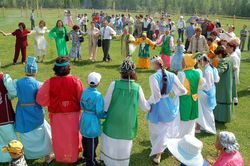Yakuts
 |
| Yakut dance with traditional costums |
| Total population |
|---|
| 456 000 |
| Regions with significant populations |
|
|
| Languages |
| Religion |
|
Russian Orthodox, with a significant part of the population practicing Shamanism |
Yakuts (sakhalar - Сахалар, Sakha - Саха, Uraankhay - Ураанхай), self-designation: Sakha, are a Turkic people[1] associated with the Sakha (Yakutia) Republic.
The Yakut or Sakha language belongs to the Northern branch of the Turkic family of languages. There are about 456,000 speakers (Russian census, 2002) mainly in the Republic of Sakha (Yakutia) in the Russian Federation, with some extending to the Amur, Magadan, Sakhalin regions, and the Taymyr and Evenki Autonomous Districts. Out of all population in Yakutia 422,000 are Yakuts[2] or about 39% of the population in Yakutia; their share lowered during Soviet rule due to forced immigration, and other relocation policies, but has slightly increased since. Given the large number of speakers, the Yakut language is considered to be somewhat less endangered than most other regional languages of the Russian Federation.
The Yakuts are divided into two basic groups based on geography and economics. Yakuts in the north are historically semi-nomadic hunters, fishermen, reindeer breeders, while southern Yakuts engage in animal husbandry focusing on horses and cattle.[3]
Contents |
Origin
Yakuts originally migrated from Olkhon and the region of Lake Baikal to the basins of the Middle Lena, the Aldan and Vilyuy rivers, where they mixed with other northern indigenous peoples of Russia such as the Evens and Evenks.
The northern Yakuts were largely hunters, fishermen and reindeer herders, while the southern Yakut raised cattle and horses.
In the 1620s Russians began to move into their territory and annexed it, renamed it Yakutia, imposed a fur tax, and managed to suppress several Yakut rebellions between 1634 and 1642. The discovery of gold and, later, the building of the Trans-Siberian Railway, brought ever-increasing numbers of Russians into the region. By the 1820s almost all the Yakuts had been converted to the Russian Orthodox church although they retained, and still retain, a number of shamanistic practices.
In 1919 the new Soviet government named the area the Yakut Autonomous Soviet Socialist Republic.
In the Soviet Union, Yakut people were systematically persecuted since 1928, when Joseph Stalin launched his ruthless collectivization campaign. The Soviet regime established numerous forced labour camps (gulags). Tens of thousands of Yakuts disappeared, and not until the late 1960s had the Yakut population recovered to pre-collectivization levels.[4]
Cuisine
The cuisine of Sakha consists predominatly of traditional drink kumis, sliced frozen salted fish, loaf meat dishes, venison, frozen fish, thick pancakes, and Salamat - a millet porridge. Kourchah, a popular dessert, is made of mare milk. Indigirka is a traditional salad. This cuisine is only used in Yakutia.
Trivia
- French producer Hector Zazou recorded a traditional Tayouks (a cappella) song. Throat singer Lioudmila Khandi performed the song, titled "Yakut Song" on the 1994 album Chansons des mers froides (Songs from the Cold Seas).
- Renowned Red Army sniper Fyodor Okhlopkov was Yakut. He was granted the status of Hero of the Soviet Union in 1965 (#10678) as well as an Order of Lenin.
See also
- Music of the Sakha Republic
Notes
- ↑ Yakut - a member of a Eurasian people of northeastern Siberia: http://www.thefreedictionary.com/Yakuts
- ↑ "The Republic of Sakha (Yakutia) - overview" Russia Trek dotcom source: Yakutsk State University;
- ↑ "Yakuts". Centre for Russian Studies. http://www.nupi.no/cgi-win/Russland/etnisk_b.exe?Yakutian. Retrieved 2006-10-26.
- ↑ Sakha Republic (Yakutia)
References
- Leontˀeva, Sargylana (2002) "Comments on Ойуун Уол 'shaman fellow': a Yakut historical legend." In John M. Clifton and Deborah A. Clifton (eds.), Comments on discourse structures in ten Turkic languages p. 287-291. St. Petersburg, Russia: SIL International.
- International Business Publications (ed.) (2001) Sakha Yakut Republic Regional Investment and Business Guide (US Government Agencies Business Library) (3rd ed.) International Business Publications, USA, ISBN 0-7397-9012-9
- Opyt Etnograficheskogo Issledovaniya (ed.) (1993) Yakuty (The Yakuts, text in Russian, w/illustrations) Opyt Etnograficheskogo Issledovaniya, Moscow
External links
- Yakut language site with lyrics, mp3 and video
- Yakut newspaper site
- A good brief description of Yakut Society
- Russian translations of Yakut texts (heroic poetry, fairy tales, legends, proverbs, etc)
- A multi-language dictionary: Yakut - Classical Mongolian - Khalkha - Russian - German - English
- Historical and administrative background
- Korolenko, Vladimir Galaktionovich (1980) "Sibirskie rasskazy i ocherki" Hudozhestvennaya literatura, Moscow in Russian
- Ethnic groups -Yakuts